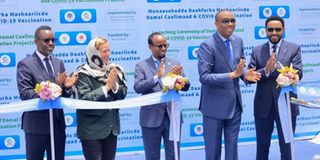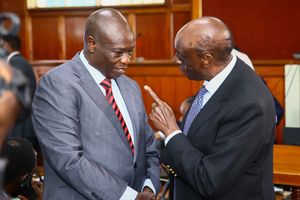Somalia’s healthcare system takes positive strides

Somalia Health Minister Ali Haji, Health Director General Guled Abdijalil and Prime Minister Hamza Barre at a recent event.
Somalia appears to be on the mend following decades of turmoil and the health sector, under the stewardship of Director General Dr Guled Abdijalil, appears to be leading the pack.
As per the World Health Organization (WHO) data, lower respiratory infections are a leading cause of death in Somalia, followed by diarrhoeal diseases, measles, tuberculosis and maternal conditions.
Besides, concerns remain on whether rural-based citizens benefit from service delivery in a country where an urban-centric approach has led to disparities in access to healthcare services.
Despite these setbacks, Dr Abdijalil has led a deliberate move by the government to strengthen the coordination of services in various departments including strategic collaboration between the Federal Government and member States.
This commenced in mid-2023 when a partnership between the health ministry, donors and health sector partners realised effective service delivery and a drop in common ailments such as headaches and flu, according to official government records.
The partnership outlined financial, technical and physical support for a unified “one country-led plan” with agreed milestones that ensure coordinated efforts towards achieving universal health coverage goals.
Further, the government also launched the first Public-Private Dialogue (PPD-TWG) in Somalia’s health sector. The dialogue aims to encourage collaboration between public and private entities to deliver accessible, equitable and affordable healthcare services.
The dialogue led to the historic opening of a National Blood Bank which is purposed to service residents caught in disaster. Also in the pipeline is a critical project involving essential healthcare packages that will directly benefit the citizens through the upgrade of infrastructure across the sex regions.
Further, in collaboration with the United Kingdom, the government has launched the “BETTER LIVES” Health project, which focuses on providing basic healthcare services to nearly 1.5 million citizens.
These achievements demonstrate commitment to expanding healthcare access, strengthening infrastructure, and bringing health services closer to the people.
Other examples of fruitful engagements with the donor community in a bid to bolster the healthcare system include technical discussions on polio eradication efforts and cold chain transition plans hosted between the government and stakeholders.
This led to the facilitation of the GAVI grant meant to improve the country’s immunisation program and vaccinate children in liberation in a bid to strengthen the health systems.
In a bid to fully integrate Somalia as a member of the East African Community where opportunities for growth lie in healthcare among the eight-member States including Kenya, Uganda, Tanzania, Rwanda and Burundi, Dr Abdijalil graced the Annual Global Health financing forum co-hosted by the World Bank and USAID in Washington where he advocated for an increase in healthcare investment in the region.
He further graced the 77th World Health Assembly in Geneva with the theme “All for Health, Health for All, "resonating with the country’s healthcare goals.
The ultimate goal for the government in healthcare is to reduce the number of deaths from curable diseases such as malaria and typhoid and ensure an increase in hospitals and healthcare workers to serve the country.
Mr Abdiweli is a journalist based in Mogadishu, [email protected]



